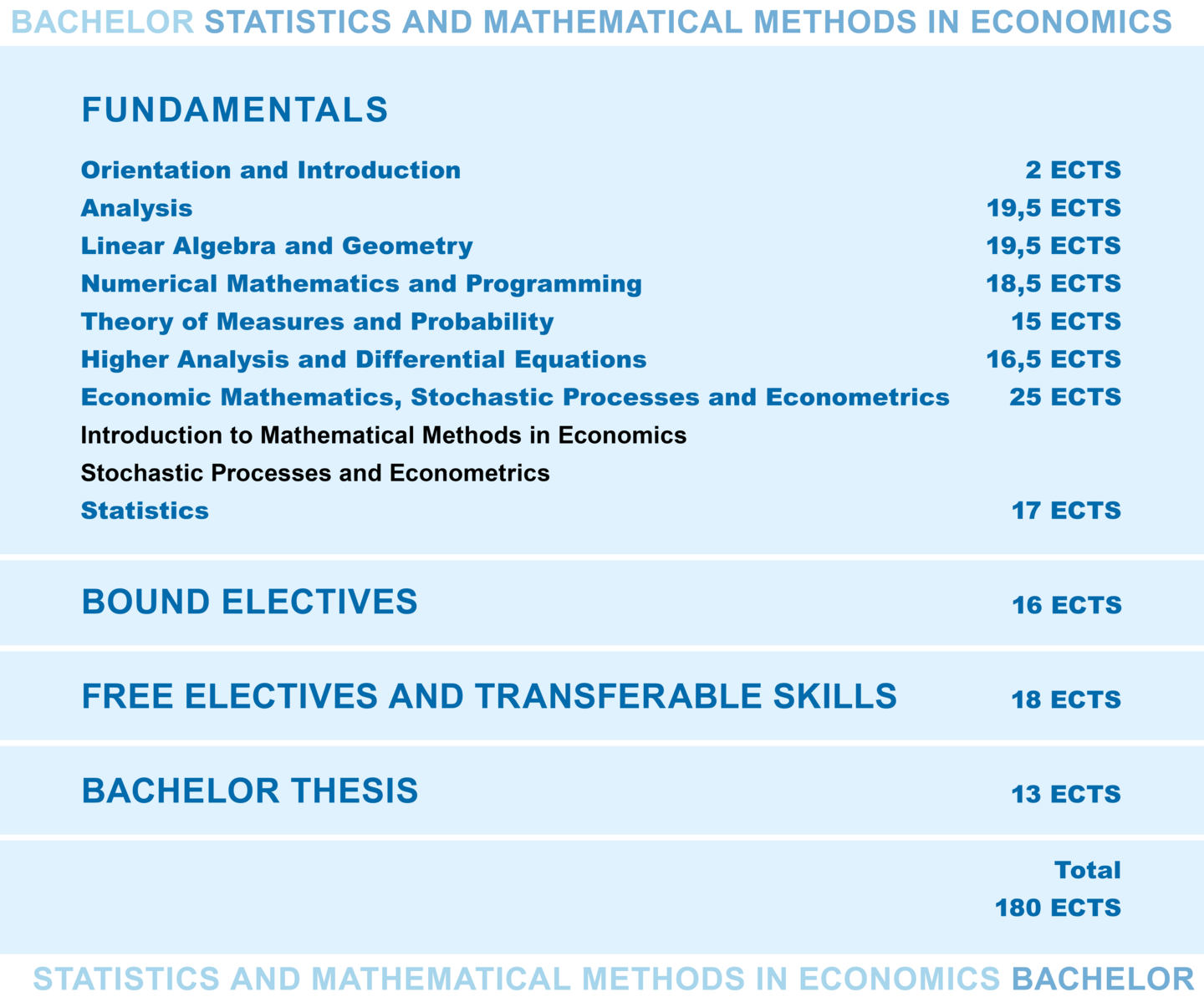Bachelor's Programme Statistics and Mathematical Methods in Economics
- Programme Code
-
UE 033 203 - Bachelor's Programme Statistics and Mathematical Methods in Economics
- Duration of Programme
-
6 semesters
- Credits
-
180 ECTS
- Language
-
German
- Degree
-
Bachelor of Science (BSc)
- Curriculum
Programme contents
The Bachelor's Programme in Statistics and Mathematical Methods in Economics is about how to collect, analyze and interpret data to make better decisions and optimize processes. You will learn various statistical methods and mathematical tools that you can apply to problems in business, science and society. This will enable you to represent complex issues in simple numbers to support the decision-making process.
Some questions in business and society are very complex and difficult to answer. Statistics and business mathematics help to understand these questions and to find well-founded answers. Graduates of the programme have good career prospects in various industries such as finance, insurance, consulting, data analysis or research.
Programme-PRe-Phase
There is no Admission Procedure for the Bachelor's Programmes in Technical Mathematics. Instead, you must familiarize yourself with the contents of the programme before admission in the so-called Programme Preparation and Reflexion Phase before the admission.
After an online survey on your planned choice of programme, you will take part in an interactive subject-specific taster course. If you wish, you can also take part in an individual counseling session.
All information on the Programme-PRe-Phase in the Bachelor's Programmes in Technical Mathematics can be found on the page of the same name.
Further information about the programme
For the Bachelor's Programme Statistics and Mathematical Methods in Economics you should have an interest in mathematics and complex problems. It is an advantage if you have scientific curiosity and the ability to work in a team, and if you like to learn new topics independently. But the most important thing is that you like mathematics, like to understand difficult concepts, can do proofs and think logically in an abstract way.
Apart from the formal conditions for admission, you do not have to meet any other requirements. You must register online in the campus software TISS, opens an external URL in a new window to participate in the Programme-PRe-Phase.
The admission takes place in the admission office of the TU Wien.
If you have any questions about the programme, you can contact the Student Union, opens an external URL in a new window and the Dean's Office of the Faculty of Mathematics and Geoinformation.
The contents of the Programme are divided into different modules. A module consists of individual courses or courses with related content. You must complete these in order to complete the module. Thematically similar modules are combined into examination subjects. These examination subjects appear on the degree certificate with the overall grade achieved upon completion of the programme.
The scope of courses and modules is expressed in ECTS points. One ECTS point represents 25 hours of work.

The Bachelor's Programme Statistics and Mathematical Methods in Economics is composed of the following examination subjects and modules.
The mandatory foundation modules are:
- Orientation and Introduction
- Analysis
- Linear Algebra and Geometry
- Numerical Mathematics and Programming
- Theory of Measures and Probability
- Higher Analysis and Differential Equations
- Economic Mathematics, Stochastic Processes and Econometrics
- Statistics
From the Bound Electives you can choose from several courses to deepen your interests. In addition, you must complete 18 ECTS from a catalog of Free Electives and Transferable Skills.
Finally, you have to write your Bachelor's thesis.
More detailed information can be found in the curriculum in TISS, opens an external URL in a new window.
In the Bachelor's Programme Statistics and Mathematical Methods in Economics you will deal with analysis, linear algebra and numerical mathematics as well as business statistics and data collection and probability theory.
You will learn to develop models and decision-making bases, to plan and optimize administrative and business processes, and to prepare and evaluate large data sets using scientific methods.
You can also choose between two specializations.
Statistics
In the Statistics specialization, you will learn how to analyze statistical data to extract information from it, how to use computers to analyze that data, and you will learn how to calculate the probability of events and how to analyze changes over time.
Mathematical Methods in Economics
In the Mathematical Methods in Economics specialization, you will learn how to solve business problems. You will learn how to apply mathematical and statistical methods to business and how to improve business processes through mathematical models and algorithms.
Statistics and Mathematical Methods in Economics has many application examples. Besides the topics like the (statistical) analysis of data and the optimization of business processes, we deal for example with the following questions:
- How can tax equalization policies best be designed to benefit low-income households?
- How can we find out if there is a gender bias in children's books?
- How can we predict how much food will be in demand in the future?
- How do surfaces develop in a random way and what are the general regularities?
Mathematical methods are very important in many areas of science, technology, economy and society. Economic mathematicians deal with the solution of problems in business, such as predictions, analyses and decision support.
As a graduate of Statistics and Mathematical Methods in Economics, you can work in banks, insurance companies, management consultancies, software companies, energy providers, telecommunications companies, in development departments in industry, at government agencies and universities or other research institutions.
In both research and practice, we are currently focusing on the following topics:
- Operations Research: you use models to make and improve decisions. For example, you can use this method to improve the planning of products and the flow in production or financial decisions.
- Economics: this field deals with the whole economy. It studies how different people and businesses work together, how products are made, distributed and sold, and how the economy grows.
- Econometrics: this branch of economics uses mathematical methods and statistical data to test economic theories and analyze economic phenomena. The goal is to understand the interrelationship of various factors and to make predictions about future events.
- Computational Statistics: This modern branch of statistics specializes in computer-based methods for data analysis.
TU Wien offers its students the opportunity to spend a semester abroad. The International Office can help and support you with the organization.
Internships are not mandatory in the programme but possible: If you are scientifically active in a company or a research institution for at least 240 hours, we can credit you with 7.5 ECTS in the module Free Electives. This activity must be recognized by the Dean of Academic Affairs.
All students at TU Wien receive a basic education in mathematics in their Bachelor's Programme. Therefore, the Faculty of Mathematics and Geoinformation has a sufficient number of professors, assistants and student assistants who supervise these students. Since a good supervision ratio is important to us, we always provide places for courses according to demand.
In the Bachelor's Programme Statistics and Mathematical Methods in Economics you will spend most of your time at the main location of the Faculty of Mathematics and Geoinformation in the Freihaus building at Wiedner Hauptstraße 8-10.
The programme is supervised by the following institutes:
- Institute of Analysis and Scientific Computing
- Institute of Discrete Mathematics and Geometry
- Institute of Statistics and Mathematical Methods in Economics
After you have completed all required courses and your Bachelor's thesis has been evaluated, you can submit your degree.
As a graduate of the Bachelor's Programme Statistics and Mathematical Methods in Economics, you will be awarded the academic degree "Bachelor of Science" - BSc for short. You can find out how to complete your Bachelor's Programme at https://www.tuwien.at/en/phy/dekant/study-degree/bachelors-programme

